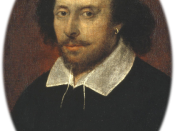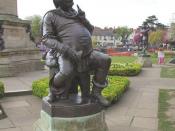Shakespeare's 'King Henry IV Part I' centres on a core theme of the conflict between order and disorder. Such conflict is brought to light by the use of many vehicles, including Hal's inner conflict, the country's political and social conflict, the conflict between the court world and the tavern world, and the conflicting moral values of characters from each of these worlds. This juxtaposition of certain values exists on many levels, and so is both a strikingly present and an underlying theme throughout the play. Through characterization Shakespeare explores moral conflict, and passage three is a prime example of Falstaff's enduring moral disorder. By this stage in the play Hal has 'reformed', moved away from his former mentor Falstaff and become a good and honourable prince.
Hal's remark to his father indicates a now strong, independent mind, predicting that Douglas and Hotspur will not accept Henry's offer because of their love for fighting.
Henry's reply in turn indicates a change in attitude towards his son, a newfound respect. Acknowledging Hal's prediction, the king orders preparations to begin, and we see he has his own set of solid moral values: knowing that their 'cause is just' helps him to reconcile with his highly honourable conscience that there is indeed cause for war. Still maintained is the conflict between the very format of the text, with Hal and Henry's conversation held in formal verse typical of the court world, in which Hal is now firmly embedded. Falstaff, however, sustains his equally typical prose speech, which indicates to the audience the enduring division between the court and tavern worlds.
As soon as the king leaves, Falstaff immediately proclaims his unashamed cowardice, asking Hal to protect him in battle. The prince retorts with an insult to Falstaff's enormous size, and abruptly bids...



Good analysis...
This text includes a very good analysis.Good work, brother.
0 out of 0 people found this comment useful.